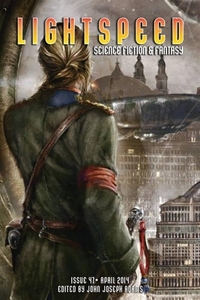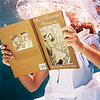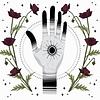Take a photo of a barcode or cover
I'm a little surprised that so many people reacted so viscerally against this novelette due to its unlikeable main character, because that didn't bother me one whit while reading -- he was loathsome, yes, but I don't think I need to sympathise with my protagonists all that much in a story this short. I definitely highlighted a few quotes along the way because I simply found them so funny, in their black humour and sheer assholery and narcissism, that when the entire world has ended and most people are suffering or dead, this guy can't get his head out of his own navel beyond his own man-pain & the concept of trying to win his girlfriend back. I definitely saw the humour in it, and didn't think we were supposed to identify with this guy.
It's surreal, dream-like, more like a fairytale than a grounded story, and I dug it.
It's surreal, dream-like, more like a fairytale than a grounded story, and I dug it.
I feel like this definitely owes something to "The Water that falls on you from nowhere" - which isn't necessarily a bad thing, it did win a Hugo after all, but it doesn't quite make itself different enough. I didn't like the main character, which isn't a problem necessarily, although I think we are meant to sympathise and I just couldn't do that. Better than the other Hugo nominees in the category buuuuut still not really Hugo material.
2015 Hugo Novelette Nominee.
This story begins with a heavy-handed metaphor: the world literally turns upside down after a young man's girlfriend dumps him. No explanation for the gravity reversal is given, but that's not what really bothered me. The protagonist was just a jerk who obsessed over his ex while billions died, a jerk who let people die in order to save his goldfish (actually, the goldfish's story arc was much more interesting than the man's). This could have been an instant classic if it had instead concentrated on the mind-expanding idea of gravity turned upside down.
This is Heuvelt's third Hugo nomination in three years. This is the best of the three, but I cannot understand his popularity. My guess is that he has benefited from special-interest balloting.
This story begins with a heavy-handed metaphor: the world literally turns upside down after a young man's girlfriend dumps him. No explanation for the gravity reversal is given, but that's not what really bothered me. The protagonist was just a jerk who obsessed over his ex while billions died, a jerk who let people die in order to save his goldfish (actually, the goldfish's story arc was much more interesting than the man's). This could have been an instant classic if it had instead concentrated on the mind-expanding idea of gravity turned upside down.
This is Heuvelt's third Hugo nomination in three years. This is the best of the three, but I cannot understand his popularity. My guess is that he has benefited from special-interest balloting.
One of my rewards for backing Women Destroy Science Fiction on Kickstarter. Great varied anthology of sci-fi and fantasy, plus a long list of new authors to check out. I love it.
Part of my Hugo Reading
I found this book incredibly frustrating. The idea of the story is quite original, although pretty implausible, but the first person narrator is such a massively annoying, entitled, unself-reflective bellend that I only read through to the end in the hope that he would get his comeuppance.
Spoiler: he didn't.
I found this book incredibly frustrating. The idea of the story is quite original, although pretty implausible, but the first person narrator is such a massively annoying, entitled, unself-reflective bellend that I only read through to the end in the hope that he would get his comeuppance.
Spoiler: he didn't.
Most people didn't seem to like this, but I found it to be quite clever. The author could have done more, but then it wouldn't have been a novelette.
Read March 2017
This story falls squarely in the weird fiction category. Many people have said the main character is unlikable, but I found his behavior understandable, if not particularly likable. I mean who hasn't wallowed in self-pity after being dumped. It just so happened he was dumped the day before the entire world went to hell.
You can read this story for free at Lightspeed Magazine.
This story falls squarely in the weird fiction category. Many people have said the main character is unlikable, but I found his behavior understandable, if not particularly likable. I mean who hasn't wallowed in self-pity after being dumped. It just so happened he was dumped the day before the entire world went to hell.
You can read this story for free at Lightspeed Magazine.
(com links para as histórias disponibilizadas gratuitamente em https://acrisalves.wordpress.com/2015/09/25/lightspeed-magazine-volume-47/)
Coordenada por John Joseph Adams (conhecido pela qualidade das antologias que organiza) esta edição da Lightspeed Magazine é dos melhores volumes que li de qualquer revista de ficção especulativa. Entre as re-edições e as novas publicações o nível de qualidade é bastante elevado, fazendo com que eu considere adquirir os restantes números organizados por John Joseph Adams.
Este volume começa com uma história de Linda Nagata, Codename:Delphi, uma história bélica em que uma mulher ajuda a coordenar, à distância, grupos de combate, analisando os dados obtidos por drones na área onde estes grupos se encontram. Coordenando não um, nem dois, mas vários grupos de combate torna-se um trabalho esgotante do qual apetece, por vezes, desistir. Sem ser o meu género de ficção científica, apresenta um cenário pouco distante da realidade actual, centrando na luta emocional de quem coordena estas regras. A história encontra-se disponível gratuitamente no site da Lightspeed Magazine.
Segue-se Francisca Montoya’s Almanac of Things that can kill you de Shaenon K. Garrity, um conto pós-apocalíptico que se apresenta num formato interessante – um misto de almanaque com diário onde quem o escreve lista as coisas que, neste mundo podem matar uma pessoa – nalgumas descreve tratamentos ou probabilidades, salientando aquelas em que, antigamente, antes da queda da civilização, seria raro falecer.
Complex God de Scott Sigler é um excelente conto irónico em que uma cientista, com recurso a pequenos robots espera limpar uma cidade do lixo radioactivo. Estes pequenos robots terão capacidade de aprendizagem e de cooperarem entre si para tarefas mais difíceis (do ponto de vista físico ou intelectual). Sendo a responsável pela solução barata e inovadora, a cientista espera colher os louros das melhores ambientais. Apesar de ter um desenvolvimento algo expectável (entre o título e a capacidade de aprendizagem / pensamento dos robots está-se mesmo a ver o rumo) consegue ser interessante pela forma como se apresenta.
Recentemente Ted Chiang tornou-se um dos meus escritores de ficção científica favoritos. Contos inteligentes com uma grande componente científica ou tecnológica que se desenvolvem logicamente a partir de premissas simples. Este volume tem um conto do autor, Exhalation que, infelizmente já tinha lido na antologia de contos.
O primeiro conto de fantasia é, a meu ver, o mais fraquito. Observations about eggs from the man sitting next to me on a flight from Chicago, Illinois to Cedar Rapids, Iowa de Carmen Maria Machado é exactamente o que o título descreve, observações disconexas sobre ovos, lançadas de forma estranha. Receitas entrelaçadas com conversa e observações fantasiosas sobre estados de um ovo que não existem.
A segunda história é, novamente, excelente, conforme detalhei em entrada própria no blog. The Day the world turned upside down de Thomas Olde Heuvelt centra-se num jovem que tenta encontrar a ex-namorada num mundo em que a gravidade o virou do avesso. Assim, tudo o que se encontrava na fase do planeta e não estava firmemente agarrado ao solo foi cuspido. Safaram-se algumas pessoas que estavam dentro das casas. Conto fantasioso, é interessante pela situação retratada acompanhando um jovem que pouco tem de herói.
Alsiso de K. J. Bishop consegue ser uma história simples mas extraordinária acompanhando a evolução do nome utilizado por um assassino desconhecido que se foi transformando em figura de carnavais e teatros. Figura anónima mas romanceada até à exaustão que passa por períodos de esquecimento apenas para ser reavivada de forma ainda mais rocambolesca.
A próxima história é de C.J. Cherryh, The only death in the city que acompanha uma civilização humana que se terá recolhido às profundezas da terra, escavando novos níveis subterrâneos sempre que surge a necessidade de expansão. Civilização decadente onde não há novas invenções e onde as pessoas renascem recordando as vidas antepassadas, podendo continuá-las. Após centenas de reencarnações os laços criados em vidas anteriores são mais fortes do que as da família e, assim que o bebé consegue falar, afirma a sua proveniência para que possa ser encaminhado para o clã. Neste mundo gasto de ciclos repetitivos, nasce uma nova alma, a única criança que é verdadeiramente criança e que por isso é tratado com condescendência por todos. Uma excelente história fantásticas que cativa quer em ideias, quer em desenvolvimento das mesmas, conseguindo tornar-se inovadora.
The Autopsy de Michael Shea é uma das grandes histórias deste volume, a reedição de um clássico que mistura horror com ficção científica acompanhando um médico legista que está a autopsiar cadáveres que sofreram uma morte misteriosa. Uma história bem longa que vai criando momento e inquietação, enquanto, cadáver atrás de cadáver, o médico se começa a aperceber de algo comum a todos eles. Sem pressas mas premeditado, consegue criar, sem muitos elementos, um cenário de forte horror.
Depois de alguns excertos (que nunca leio) e de entrevistas (que raramente me interessam) segue-se a galeria do artista responsável pela capa, Rémi Le Capon, com arte de vários géneros onde, na maioria, se denota um contraste entre as zonas escuras e difusas e as zonas luminosas de maior detalhe, criando imagens muito centradas nas figuras principais e pouco detalhadas nos cenários. No portfolio encontram alguma das imagens publicadas nesta revista.
Coordenada por John Joseph Adams (conhecido pela qualidade das antologias que organiza) esta edição da Lightspeed Magazine é dos melhores volumes que li de qualquer revista de ficção especulativa. Entre as re-edições e as novas publicações o nível de qualidade é bastante elevado, fazendo com que eu considere adquirir os restantes números organizados por John Joseph Adams.
Este volume começa com uma história de Linda Nagata, Codename:Delphi, uma história bélica em que uma mulher ajuda a coordenar, à distância, grupos de combate, analisando os dados obtidos por drones na área onde estes grupos se encontram. Coordenando não um, nem dois, mas vários grupos de combate torna-se um trabalho esgotante do qual apetece, por vezes, desistir. Sem ser o meu género de ficção científica, apresenta um cenário pouco distante da realidade actual, centrando na luta emocional de quem coordena estas regras. A história encontra-se disponível gratuitamente no site da Lightspeed Magazine.
Segue-se Francisca Montoya’s Almanac of Things that can kill you de Shaenon K. Garrity, um conto pós-apocalíptico que se apresenta num formato interessante – um misto de almanaque com diário onde quem o escreve lista as coisas que, neste mundo podem matar uma pessoa – nalgumas descreve tratamentos ou probabilidades, salientando aquelas em que, antigamente, antes da queda da civilização, seria raro falecer.
Complex God de Scott Sigler é um excelente conto irónico em que uma cientista, com recurso a pequenos robots espera limpar uma cidade do lixo radioactivo. Estes pequenos robots terão capacidade de aprendizagem e de cooperarem entre si para tarefas mais difíceis (do ponto de vista físico ou intelectual). Sendo a responsável pela solução barata e inovadora, a cientista espera colher os louros das melhores ambientais. Apesar de ter um desenvolvimento algo expectável (entre o título e a capacidade de aprendizagem / pensamento dos robots está-se mesmo a ver o rumo) consegue ser interessante pela forma como se apresenta.
Recentemente Ted Chiang tornou-se um dos meus escritores de ficção científica favoritos. Contos inteligentes com uma grande componente científica ou tecnológica que se desenvolvem logicamente a partir de premissas simples. Este volume tem um conto do autor, Exhalation que, infelizmente já tinha lido na antologia de contos.
O primeiro conto de fantasia é, a meu ver, o mais fraquito. Observations about eggs from the man sitting next to me on a flight from Chicago, Illinois to Cedar Rapids, Iowa de Carmen Maria Machado é exactamente o que o título descreve, observações disconexas sobre ovos, lançadas de forma estranha. Receitas entrelaçadas com conversa e observações fantasiosas sobre estados de um ovo que não existem.
A segunda história é, novamente, excelente, conforme detalhei em entrada própria no blog. The Day the world turned upside down de Thomas Olde Heuvelt centra-se num jovem que tenta encontrar a ex-namorada num mundo em que a gravidade o virou do avesso. Assim, tudo o que se encontrava na fase do planeta e não estava firmemente agarrado ao solo foi cuspido. Safaram-se algumas pessoas que estavam dentro das casas. Conto fantasioso, é interessante pela situação retratada acompanhando um jovem que pouco tem de herói.
Alsiso de K. J. Bishop consegue ser uma história simples mas extraordinária acompanhando a evolução do nome utilizado por um assassino desconhecido que se foi transformando em figura de carnavais e teatros. Figura anónima mas romanceada até à exaustão que passa por períodos de esquecimento apenas para ser reavivada de forma ainda mais rocambolesca.
A próxima história é de C.J. Cherryh, The only death in the city que acompanha uma civilização humana que se terá recolhido às profundezas da terra, escavando novos níveis subterrâneos sempre que surge a necessidade de expansão. Civilização decadente onde não há novas invenções e onde as pessoas renascem recordando as vidas antepassadas, podendo continuá-las. Após centenas de reencarnações os laços criados em vidas anteriores são mais fortes do que as da família e, assim que o bebé consegue falar, afirma a sua proveniência para que possa ser encaminhado para o clã. Neste mundo gasto de ciclos repetitivos, nasce uma nova alma, a única criança que é verdadeiramente criança e que por isso é tratado com condescendência por todos. Uma excelente história fantásticas que cativa quer em ideias, quer em desenvolvimento das mesmas, conseguindo tornar-se inovadora.
The Autopsy de Michael Shea é uma das grandes histórias deste volume, a reedição de um clássico que mistura horror com ficção científica acompanhando um médico legista que está a autopsiar cadáveres que sofreram uma morte misteriosa. Uma história bem longa que vai criando momento e inquietação, enquanto, cadáver atrás de cadáver, o médico se começa a aperceber de algo comum a todos eles. Sem pressas mas premeditado, consegue criar, sem muitos elementos, um cenário de forte horror.
Depois de alguns excertos (que nunca leio) e de entrevistas (que raramente me interessam) segue-se a galeria do artista responsável pela capa, Rémi Le Capon, com arte de vários géneros onde, na maioria, se denota um contraste entre as zonas escuras e difusas e as zonas luminosas de maior detalhe, criando imagens muito centradas nas figuras principais e pouco detalhadas nos cenários. No portfolio encontram alguma das imagens publicadas nesta revista.






